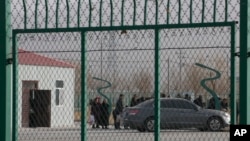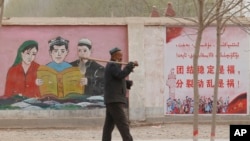A Uyghur man who calls himself Jamal left China in recent weeks and talked to VOA about life in Xinjiang in 2022. Fearing retaliation from China for talking to the media, the Uyghur man is using an assumed name in order to protect relatives who still live in Xinjiang.
In a report released in August, the U.N. human rights office said China has committed serious human rights violations in Xinjiang. Human rights organizations have accused China of arbitrarily detaining Uyghurs and other Muslim ethnic minorities. There have also been accounts by former detainees of torture within the facilities.
Many Western countries, including the United States, have described China’s treatment of the Uyghurs as genocide. China has repeatedly denied the accusations, calling them lies and false information. Through the state news agency Xinhua, Beijing said the detention centers were “vocational education and training centers” to counter terrorism and extremism.
Over 11 million Uyghurs live in the Xinjiang Uyghur Autonomous Region in northwestern China, according to China’s 2020 census, which is 45% of the total population of the region’s 25 million inhabitants. More than 10 million Han Chinese, the country’s majority ethnic population, live in the region. The others there are from majority Muslim ethnic groups, including Kazakhs, Kyrgyz, Uzbeks and Huis (Chinese Muslims).
The interview has been edited for length and clarity.
VOA: In August, the U.N. report on Xinjiang said China restricted the free movement of majority-Muslim populations in Xinjiang and confiscated passports of Uyghurs and other predominantly Muslim minorities. Is it true?
Jamal: Yes, it is a reality. For Uyghurs, they had started confiscating passports ... in 2016; we had to hand in our passports to the police bureau’s national security division. They said they would keep our passports for safekeeping and would give [them back to] us if we needed to go abroad. The first priority of the Chinese policy on passports in Xinjiang is to not let anyone cross borders and to keep everyone intact inside the region. … The government policy has been clear that they don’t issue new passports to Uyghurs.
VOA: Then how were you able to go abroad with a valid Chinese passport if the government policy is to not return or issue passports to Uyghurs?
Jamal: My spouse is a foreign citizen. I had tried for years and gone through all the red tape in order to get my passport. Also, the authorities were pressured to return my passport since my spouse was a foreigner. That was, I think, the most important factor why the government returned my passport.
VOA: Can you tell us what procedure you have gone through to get your passport back and leave China?
Jamal: The first step is that [police] check your and each of your family members’ background on the Integrated Joint Operations Platform. If you and your family member come clean on that system – I mean, if they don’t find anyone who had been convicted, sentenced to prison or had any history of being sent to a reeducation camp – then they would ask you to wait for a final decision from the head of the police bureau on whether to return your passport. At the end, if the decision was positive, they would return your passport.
But it does not mean that you can go abroad with that passport. Any Uyghur passport holder should be able to present a consent document from the Xinjiang authorities at any customs in China. If a Uyghur person has a valid Chinese passport and a visa to go to a certain country but doesn’t have that government consent document, customs won’t let them cross the border. When a Uyghur presents his Chinese ID, passport and consent document to the customs officers, they would take that person to a special designated place for Uyghurs and then call the police authorities in Xinjiang to authenticate the document. If the Xinjiang police corroborate, then customs would let you go.
VOA: What is it like to be a Uyghur in Xinjiang in 2022?
Jamal: In 2022, some Uyghurs who had been released from reeducation camps were transferred to work in factories either in Xinjiang or China’s interior. The ones who were not transferred to factories couldn’t easily find jobs because of their past history and government discrimination. Government employees who had gone to reeducation were not allowed to return to their old positions. In one example, a literature professor I knew now sits in a surveillance control room of his school campus as a guard. Some were never released from reeducation and instead sentenced to prison.
Another trend in 2022 in Xinjiang is that the Chinese government never stopped arbitrary arrests of Uyghurs and even started rearresting Uyghurs who had gone through reeducation in the past. I had a friend who was a lecturer at a university. He had been arrested twice before 2022. In the spring of 2022, he was arrested for the third time, and his family never heard of him again. If I sum up life in 2022 for Uyghurs in Xinjiang, it’s the normalization of the combination of fear and hopelessness.
VOA: You said the government continued arbitrary arrests. Did the government stop arresting people during COVID lockdowns in Xinjiang in 2022?
Jamal: Each time, average people would be forced to stay at home during COVID lockdowns. One difference of the COVID lockdown in Xinjiang from other parts of China is that the security apparatus [police] were more active during lockdowns in searching homes and arresting more people.
VOA: What else do you think the world should know about what happened to the Uyghurs in Xinjiang in 2022?
Jamal: One thing that the world should know is that in May of 2022, when Michelle Bachelet [then the U.N. high commissioner for human rights] came to visit the region, I was in Urumqi, and I witnessed that the government sealed, closed the majority Uyghur district in the city during her visit under a pretext that there were some asymptomatic COVID cases in the district. They opened the district after [Bachelet] left China. One Chinese government official neighbor of mine told me the reason for the lockdown in May was because the government didn’t want Uyghurs to move freely during her visit to the city.
VOA: How about life in Xinjiang for the Han Chinese?
Jamal: Many Uyghurs face a lot of hurdles if they want to go to other parts of the region or China. They have to get special permission from the authorities first. Han Chinese people can move freely compared to Uyghurs, Kazakhs or other local populations. Their movement is not restricted. Recently under the “zero-COVID” policy, some Han Chinese started to feel and say that their freedom of movement had begun to be restricted.





